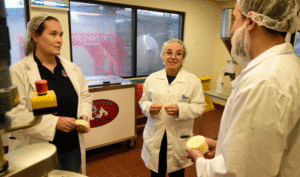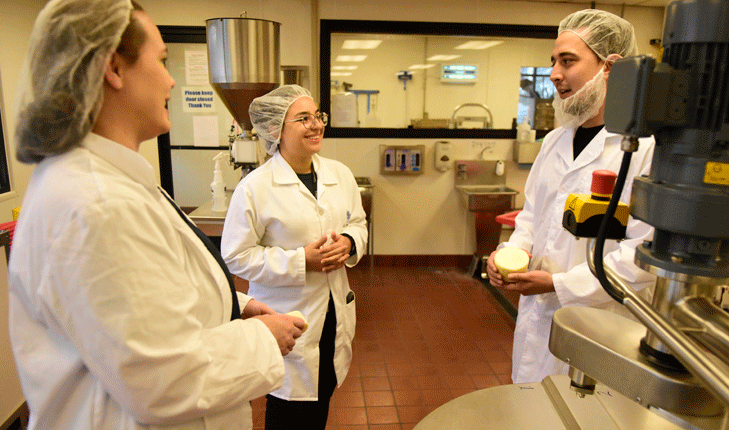Fresno State graduate student Daniel Olmos is channeling his love of science and food to integrate two of his favorite campus farm products into his graduate research project.
Working with food science and nutrition faculty Dr. Carmen Licon Cano, the Fresno-native Olmos is creating a new, wine-infused cheese product that he hopes to produce at the campus creamery for the Gibson Farm Market, and later potentially on a larger scale.
“When you try to produce cheese and wine, there is a fair bit of chemistry and microbiology to consider,” Olmos said. “An infused cheese like this is an artisanal product that you might see produced in Spain or other parts of the world, so it’s exciting to consider its potential here. Dairy products are exciting to work with since they’re very functional, nutritious and delicious.”
The push to develop new products in the nation’s leading dairy state is also the impetus behind a new, three-year $1.8 million grant from the U.S. Department of Agriculture (USDA) Agricultural Marketing Service aimed at dairy business innovation.
Licon will work with Dr. Susan Pheasant, director of the Institute for Food and Agriculture at Fresno State, to coordinate a program that will position students, faculty, staff and campus facilities to support industry partners in California, Oregon and Washington to launch a newly-created Pacific Coast Coalition for dairy processors.
Other faculty with dairy processing expertise from Cal Poly-San Luis Obispo, Humboldt State, UC Davis and Oregon State University will share their experience to help companies become more competitive and innovative.
Veronique Lagrange, the director of the California Dairy Innovation Center, will also serve as a project co-organizer. The center’s direct ties to companies will help to create programs that encourage diversification of product lines; enhance product packaging, marketing and branding; and create workforce training programs to improve supply chain methods.
California is the leading dairy state with over $40 billion in production annually, but many of its dairies and processors have faced recent fiscal difficulties that have been complicated by the COVID-19 pandemic.
 “This collaboration is why the California Dairy Innovation Center was created, to support collaboration and attract investment in California’s dairy industry,” said John Talbot, CEO of the California Milk Advisory Board. “The Pacific Coast Coalition will contribute to our competitive advantage in global markets and directly benefit our regional businesses. It will be instrumental to stimulating innovation and entrepreneurship, strengthening the development of our workforce pipeline and ultimately leading to the increased use of our milk in value-added products and raising returns to farmers.”
“This collaboration is why the California Dairy Innovation Center was created, to support collaboration and attract investment in California’s dairy industry,” said John Talbot, CEO of the California Milk Advisory Board. “The Pacific Coast Coalition will contribute to our competitive advantage in global markets and directly benefit our regional businesses. It will be instrumental to stimulating innovation and entrepreneurship, strengthening the development of our workforce pipeline and ultimately leading to the increased use of our milk in value-added products and raising returns to farmers.”
Fresno State students will benefit from a new internship program and research positions that will prepare them for future employment while working directly with companies.
The five participating universities will offer 600 hours of technical assistance to the industry through workshops, short courses and webinars to foster innovation and best practices, often in bilingual forms to improve the implementation by Spanish-speaking workers.
Cal Poly-San Luis Obispo will host a fall convention to bring industry and academic partners together. In subsequent years, UC Davis and Fresno State will host hands-on technical workshops.
“The California Dairy Innovation Center has been a great asset in interacting with hundreds of producers and getting feedback on their needs,” Licon said. “The Central Valley has a reputation as a dairy leader, so this program brings them closer to researchers and our campus. As the companies become more profitable, our campus creamery and students get a one-of-a-kind experience, too.“
Pacific Coast Coalition dairy processors will benefit from an awards program that will use half of the grant funds to recognize and help implement innovative dairy products and practices.
The $1.8 million grant award is part of a $20.2 million announcement that included $18.4 million in second-round Dairy Business Innovation initiative grants to the University of Tennessee, University of Wisconsin and Vermont Agency of Agriculture, Food and Markets. The three programs each previously received initial grants of $600,000 that were tailored to their area industry needs.
To better position Fresno State’s role in the program, a new, pilot plant creamery will feature modern industry technology that will create products in smaller volumes while encouraging hands-on learning, research and product development. New campus equipment will include:
- A new cheese processing vat, donated by the Leprino Foods Company Foundation. Leprino Foods is a global leader in mozzarella cheese production and has two manufacturing facilities in the Central Valley.
- A mozzarella cheese stretcher, cooker and molder.
- A membrane separation system to filter various components from milk to make different types of products, and to study specific nutritional content.
The pre-existing campus creamery, which currently provides dairy products to the Gibson Farm Market, is also adding new equipment, including:
- A powder induction and dispersion machine.
- An ice cream container filler and rotation equipment.
- An ice cream mix storage bag filler.
- A 300-gallon processor and storage tank to increase batch size and processing efficiency.
Fresno State graduate student Joanie Snow (of Visalia), sees added value in the new emphasis on dairy processing equipment, research and learning opportunities.
Like Olmos, she received her undergraduate degree from the Fresno State Food Science and Nutrition Department. She is now conducting follow-up graduate research on consumer preferences and sensory responses to cheese aromas, which is being overseen by Licon.
Glancing ahead at her career path, she is equally drawn toward the product development side like Olmos, for which the new equipment and professional contacts will play a key role.
For example, the membrane separation equipment will provide experience working with whey proteins used in high-protein sports nutrition drinks. She is also exploring potential products that could reuse acidic whey from the cheesemaking process. This liquid byproduct is normally considered waste, but she is starting to test its potential as a beverage ingredient.
“Food and beverage product development is a very interesting area, but it requires a lot of experience in research and sensory evaluation,” Snow said. “Having all of these resources together in one location primes Fresno State as a new leader in this area.”





